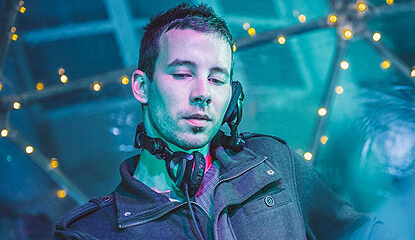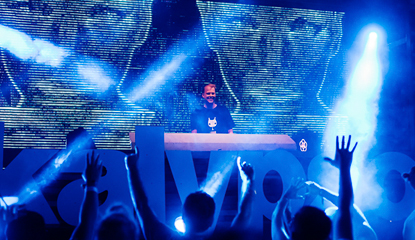During a successful music career spanning over two decades, classically trained multi-instrumentalist, DJ and producer Haris Čustović, has well and truly lived the dream.
With an MA in Sound Arts, a musical background playing violin and piano, his talent, drive and passion are reasons why his work has been recognised and featured on many respected labels such as The End, Distinctive, Global Underground and Swag records. Haris has attracted the attention of a lot people within the scene and received plenty support and praise from both the underground and premier league DJs, such as Laurent Garner, Hernan Cattaneo, MR C and Terry Francis.
Using technology as a tool of expression, Haris has developed his own style, combining organic with synthetic such as live instruments with synthesisers.
1. The most prominent facet of your work is experimentation and technical excellence. You often venture into experimental, classical and acoustic and merge it with the electronic. Do you think that electronic music today uses enough of the resources of other genres and who would you like to highlight with a similar aesthetic to yours?! !
I do not think that dance music does this enough at all. A lot of it is very formulated, just type in into youtube “how to make techno”, or deep house, or dubstep, any genre at all and you will get very precise instructions how to do it, from making a kick drum, to everything else. A lot of music makers nowadays are also using ready made sample packs where sounds are dropped into a sequencer such as Ableton live and not even edited, so that must tell you something. Classification of music, over genre-ising, and putting all music into little boxes was always a bit of a problem for music makers. It helps digital download sites to organise their stock as you can easily navigate to a certain genre. The problem with that is that for example a lot of minimal techno starts sounding exactly the same. And if music is too far from the recipe, it does not fit that category. Another thing is that a lot of people who make electronic music manically run away from exploring music theory therefore missing out on a lot of potential good new ideas, as being super cool nowadays is not considered having a lot of harmonic changes in a piece, but having a hard track with a lot of stacked loops. My first contact with crossover forms was with jazz funk fusion and I look up to people like Herbie Hancock who quite successfully mixed electronic and acoustic elements. Derrick May did a great job with Strings of Life and Carl Craig mixed disco with techno elements. It was inspiring how Leftfield used afro-futurist concepts in and Banco De Gaya used ethnic elements with bass heavy music.! !
2. You gained a classical musical education and play the violin and piano. What have those first years thought you and how have they made you a better electronic artist? Since you had your father’s full support tell us how was it to collaborate with him on your "Electro
Oro"?! !
Music school education gave me understanding of different musical forms, melodic structures, ability to play musical instruments, and understanding of sound dynamics and dimensions, skills that are crucial in composition process as well as in the studio. I had a great piano teacher who was into 20-th century avant-garde music that composed his own pieces and used piano in more ways than just striking the keys. He use to dampen and pluck strings with his fingers, hit the body as if it was a huge drum etc. and did other things in order to see how far he can go beyond a traditional use of the instrument and that was very inspiring to me as a student.!
It was really great to collaborate with my stepfather on a house track. He was very open minded and amongst other sounds, he was into traditional Macedonian music. So we made an attempt to use 7/8 time signature in electronic track, keeping the groove very straight and minimal. We also sampled and edited some old gipsy artist record and run the sound through different effects and processors. On a 4/4 mix, we added a Reece bass line and there was the combination that we stuck to before finishing the arrangement. Asad Rizvi made a great remix for it too and we released it on Laus Records, release did very well at the time. Collaboration is a great thing to do and can open many creative doors that a single artist maybe would not open their self. It is also more fun to produce with like minded people. ! !
Live set @ Jungla, Split - 1.5.2015. by Hariscustovic on Mixcloud
3. How did moving to London influence you? What were the first few years of discovering the scene like, and what do you think would have been different in your work had you never left Dubrovnik? Would you recommend the young artist to leave their mother land and explore other scenes?!
Moving to London was good as this is a big city with great music scene history, a lot of studios, but also great source of music. It was great to hear a lot of new styles for the first time and meet people who were into similar things. If I have stayed in Dubrovnik my experience would be different in terms of accessing new music as we did not have the internet widely available in the early 90’s. Nowadays one does not have to leave their place if they live away from the big city centres to explore new music, meet new people and even collaborate, it can be all done online which is great. But there is still something in meeting people in person, going into a music store, walking into a random party of a club and having a real experience. It is always good to travel and explore different places and cultures, and if there is an opportunity, it is definitely worth having a right experience. Just depends what someone wants and how badly they want it.! !
4. Your Laus label has been credited as having a huge impact on the underground house scene? What was the first intent behind opening it and how do you choose the material? What is your hook?! !
I wanted to have a chance to release music without anybody's approval, which was not easy at the time as there was no digital distribution. I had a studio, label concept and three first releases ready so one of the distributors offered me a deal. Most artists on the label who produced and remixed music were people who were around Laus studio at the time. My idea was always to release music that had dance floor appeal and used crossover concepts. ! !
5. There is hardly a place where you didn't play all over the world. What is your fondest memory and what club captivated you? What have you got prepared for show in Jungla and your home town? What can the dancers look forward to?! !
I have great memories of Valkana Beach Festival where I have played the main stage with Danny Rampling, Circulation, Ian Pooley and Danny Howells. Pacha in Buenos Aires is a fantastic club where I have played few times, Zouk in Singapore and Fabric in London were all highlights of my dj career. All top clubs with amazing facilities and high level of professionalism. I have prepared a diverse set and punters can expect a lot of energetic music, a journey through sonic landscapes. Hope they will enjoy it.! !
6. Wild Card question: What advice would you give to your younger self? Do you have any regrets or did it all turn out as you had hoped it would?! !
Probably to work and focus harder. I do not really have any regrets, I believe that in life things happen for a reason and that people get what is due to them, sooner or later. One has to follow their star, strive forward and not look back, believe in yourself and good things will happen and no matter how hard it can be, there is a a light at the end of the tunnel. And hopefully thats won’t be a train coming!



